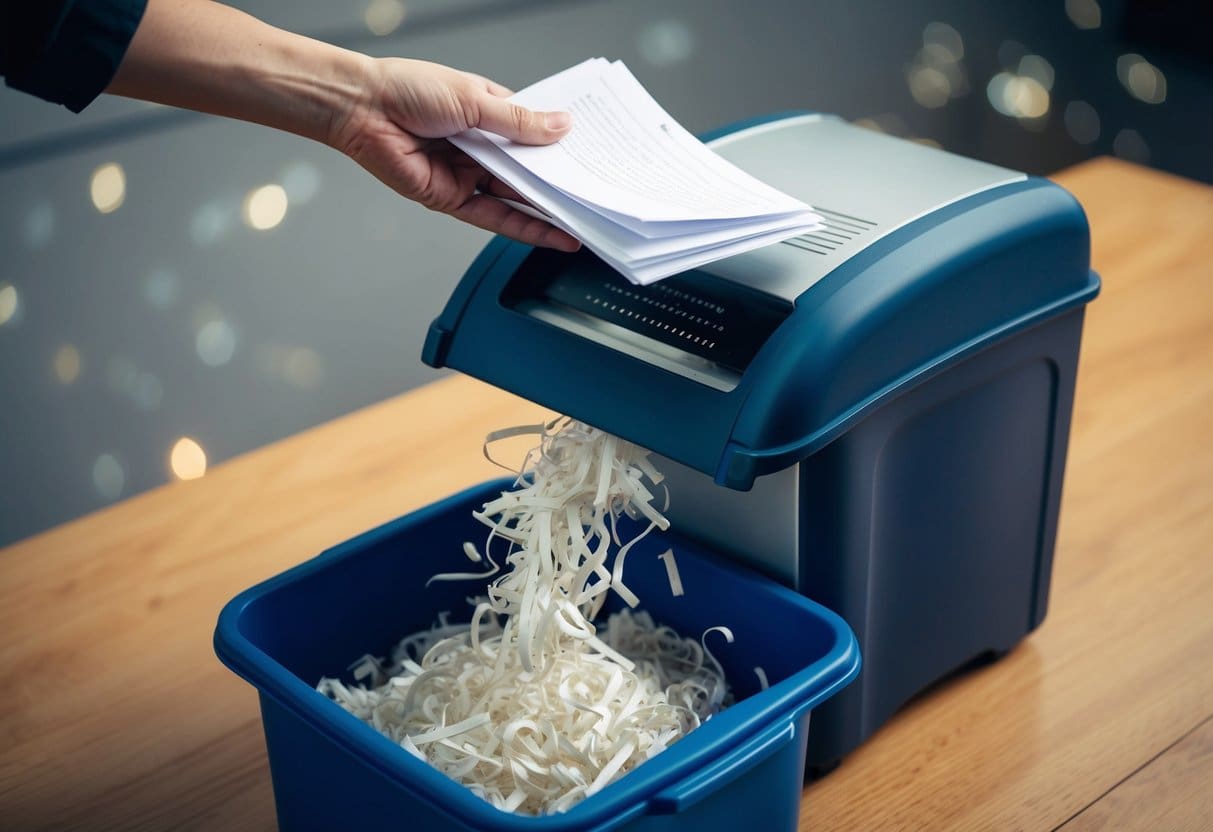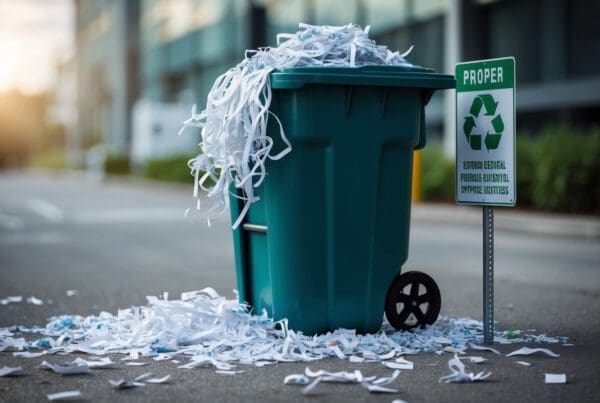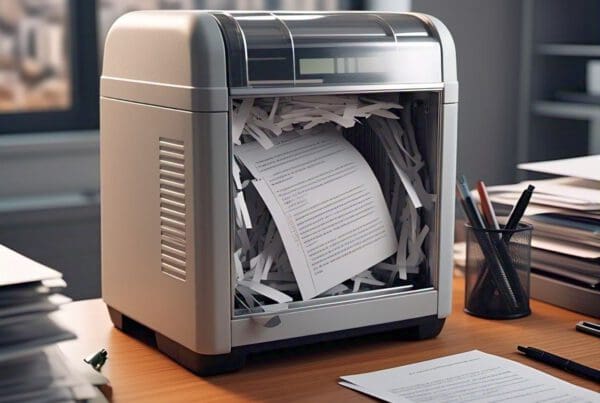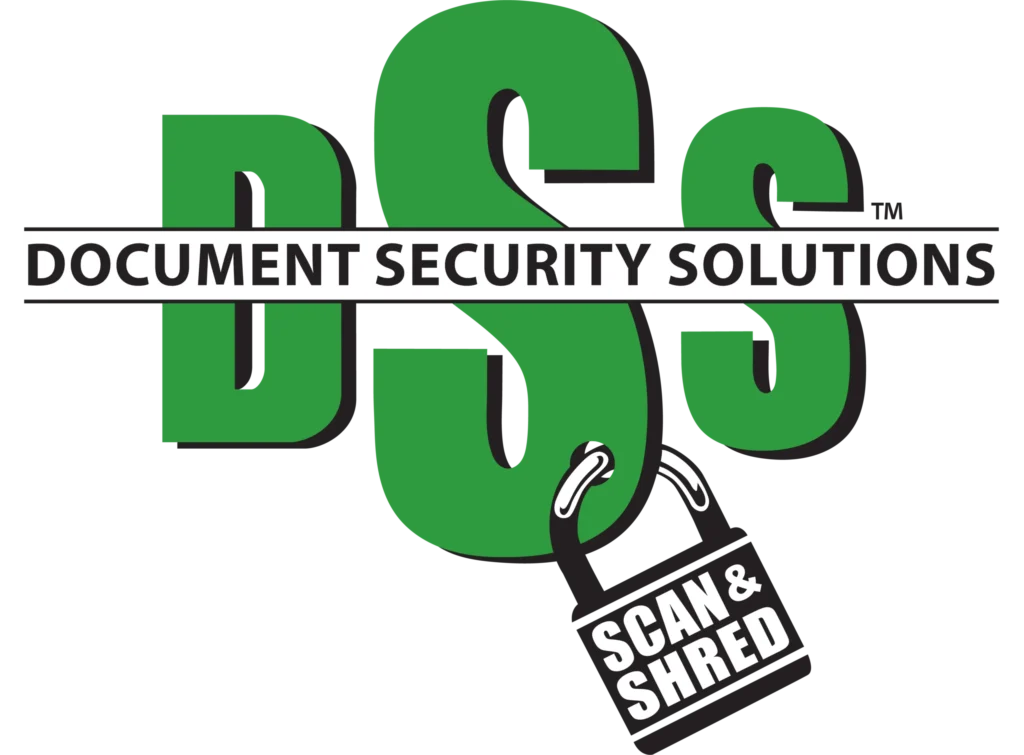Overview of Document Shredding Services

Selecting the right document shredding service is crucial for protecting sensitive information and maintaining compliance with privacy laws. We explore the main aspects of document shredding, emphasizing its importance in safeguarding data and adhering to regulatory requirements.
Defining Shredding Services
Document shredding services are designed to securely dispose of paper documents containing confidential information. These services use high-grade shredders that cut paper into tiny pieces, making reconstruction nearly impossible.
Shredding can occur on-site, where a truck visits your location, or off-site, where documents are collected and shredded at a secure facility. Some services offer scheduled shredding, an ongoing process that regularly disposes of documents. We may also consider one-time, purge services for occasional destruction needs.
Using professional shredding ensures that sensitive business data and personal information remain confidential, reducing risks associated with information theft.
Importance of Document Destruction
Document destruction is vital to prevent unauthorized access and potential identity theft. Many documents, like financial records or personal data, hold sensitive details. Failing to dispose of them properly can lead to data breaches. Shredding protects against these risks by rendering information unreadable. Proper shredding practices contribute to a secure work environment and build trust with clients.
We recognize the need for document destruction as an integral part of any organization’s information security strategy. By securely destroying unnecessary files, we eliminate opportunities for data misuse.
Navigating Privacy Laws and Standards
Understanding privacy laws is essential when managing document shredding. Regulations like the GDPR in Europe or HIPAA in the United States mandate proper disposal of personal data. These laws require organizations to ensure that confidential information is destroyed securely.
Document shredding services help us meet these legal obligations. Regular audits and certificates of destruction provided by shredding companies can demonstrate compliance.
Awareness of these standards guides us in selecting services that align with our regulatory responsibilities. By adhering to these guidelines, we help protect personal privacy and uphold data protection commitments.
Types of Shredding Services and Processes

Document shredding is essential for maintaining privacy. Let’s take a closer look at the main methods and processes involved in shredding services.
On-Site vs Off-Site Shredding
Shredding can occur either on-site or off-site.
On-site shredding means the shredding company brings a truck equipped with a shredder to your location. This allows you to watch the entire shredding process. It’s great for ensuring trust and security.
In contrast, with off-site shredding, documents are collected and transported to a secure facility for shredding. Off-site is often chosen for handling larger volumes since it’s cost-effective. Both options emphasize protecting sensitive information, but they differ in immediate visibility and logistics.
Mobile Shredding Explained
Mobile shredding offers convenience by bringing the shredder directly to us. A shredding truck arrives at our location, where documents are securely shredded on the spot. This service is ideal for organizations with a large amount of paper shredding needs that demand immediate disposal. It saves us time and adds a level of security, as we can witness the shredding process. Mobile shredding can be scheduled regularly or requested for one-time purges, allowing flexibility based on our specific requirements.
Drop-Off Shredding Solutions
Drop-off shredding presents an alternative for those who prefer to transport their documents to a shredding facility. By delivering documents to the center ourselves, we ensure they are securely handled by professionals. This option suits individuals and businesses with fewer documents, or when shredding needs aren’t urgent. Most facilities offer flexible hours, making it a convenient choice for non-urgent situations. We can often pair drop-off services with recurring shred service plans, facilitating ongoing protection of our sensitive data.
Scheduled and One-Time Shredding Options
Regular and one-time shredding options cater to different needs.
Scheduled shredding involves setting up periodic shredding appointments, which is beneficial for businesses handling sensitive documents regularly. This ensures a steady protection plan through a recurring shred service.
One-time shredding, often called a purge shredding service, caters to those who need to dispose of a large volume of documents at once. It’s perfect for annual cleanouts or legal compliance requirements. Both options play a crucial role in effective data management.
Choosing the Right Shredding Service

We must carefully choose the right shredding service to ensure that sensitive documents are securely destroyed. It is important to consider our specific needs, such as cost and security protocols, as well as any additional services offered.
Assessing Shredding Needs and Costs
To select the best paper shredding services, we start by understanding our shredding needs. Residential shredding is suitable for home use, while industrial shredders are better for large businesses. Considering the document shredding cost is crucial. Comparing prices for one-time and ongoing services helps us stay within budget.
Community shred events are a great way to dispose of sensitive documents at a lower cost. These events often offer paper recycling, helping us be environmentally conscious. For businesses, regular secure shredding might be more suitable. By assessing our needs and budget, we find the right match.
Certifications and Security Protocols
Certifications are essential in choosing a reliable service. NAID certification ensures high standards and secure shredding of personal information. Certified shredding companies follow strict guidelines to prevent data breaches.
Security protocols are equally important. We need to check if the service uses sealed bins and provides a secure chain of custody. Monitoring systems such as video surveillance add another layer of security.
Additionally, we should ensure the company has experience in hard drive destruction, as digital files also need protection.
Additional Destruction Services
Some services offer more than just document shredding. We might need hard drive destruction for electronics. An industrial shredder may be necessary for bulky items. Community shred events sometimes extend to electronic waste, offering a convenient way to discard digital devices.
Some companies provide additional pickups for businesses needing frequent service. By identifying these extra options, we ensure that all types of sensitive materials, from paper to hard drives, are addressed securely.





